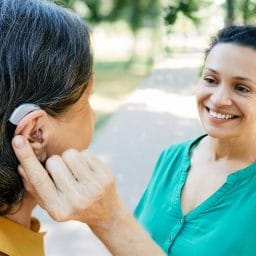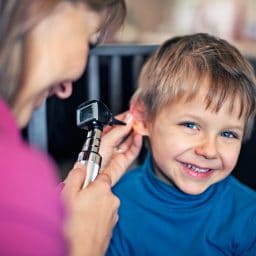What To Know About Tympanosclerosis

Tympanosclerosis is a medical condition characterized by scar tissue on the tympanic membrane, commonly known as the eardrum, and within the middle ear cavity. This post-inflammatory disorder can lead to varying degrees of hearing loss and, in some cases, might not present any symptoms. Chronic inflammation in the middle ear is often cited as a…
Tips to Enjoy Holiday Dinners With Hearing Loss

Holiday dinners are full of great food, time with your loved ones and lots of laughter. However, for those with hearing loss, they may also present some unique challenges. Approximately one in eight people in the United States aged 12 years or older has some degree of hearing loss in both ears. Hearing loss can…
What Are The Differences Between Conductive and Sensorineural Hearing Loss?

Not all hearing loss is the same. Let’s explore the differences between conductive and sensorineural hearing loss, including causes and potential treatment options. Sensorineural Hearing Loss Sensorineural hearing loss (SNHL) occurs when there is damage to the hair cells of the inner ear or, less commonly, the auditory nerve. Once damage occurs, it cannot be…
A Test Used for Newborn Hearing Screenings Might Also Detect Autism

Universal newborn hearing screenings test millions of infants for hearing loss every year. In the near future, they may be able to help diagnose autism spectrum disorder (ADS) as well. What is an Auditory Brainstem Response Test? The auditory brainstem response (ABR) is one part of newborn hearing screenings. It measures how well a baby’s…
The Link Between Smoking & Hearing Loss

In addition to cancer, heart disease, stroke, lung disease, diabetes and chronic obstructive pulmonary disease (COPD), smoking cigarettes is linked to hearing loss. Smoking doesn’t just put yourself at risk, but also those around you. We explore this link in more detail below. What the Studies Show There has been a lot of research on…
How Auditory Training Can Help You Make the Most of Your Hearing Aid

If you don’t know much about computer programming you might take a class at Spartanburg Community College, but what do you do if you want to learn more about your hearing aids? Being diagnosed with hearing loss and learning to use hearing aids can be quite an adjustment. Some people find that they can benefit…
Why Are Some Sounds Spookier than Others?

Halloween is right around the corner, which means you may be spending time going to the pumpkin patch, walking through haunted houses or watching horror movies at Regal Spartan Cinemas. If you enjoy scary activities during this season, you may be asking yourself what makes them so terrifying? The answer in many cases comes down…
What are Ear Tubes?

Grommet. That’s a funny-sounding word that could mean peace and peace of mind for parents of very young children. It’s not a fascinating new toy based on the Muppets or the Minions. And it’s not some new sound-cancelling headphone that will override the heart-rending cries of a child in pain. It’s a really tiny, rubbery tube – maybe two millimeters overall…
